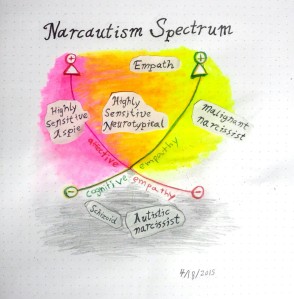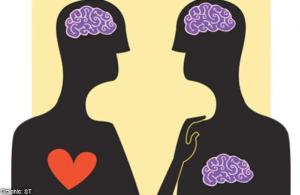The concept of malignant narcissism and HSP traits coexisting in the same person is a matter that has very little research behind it (I could find nothing at all on Google), so this article is based on my own opinions, gleaned through a combination of my readings and personal observations of the narcissists I have known. My opinion may come as a surprise.
In my article A Match Made in Hell: Narcissists and HSPs, I wrote about the tendency for narcissists and HSPs to form trauma-bonds with each other–that’s really just a fancy way of saying these two seemingly opposite types of people are often drawn to each other and become codependent on each other. The narcissist is both attracted to and repelled by the HSP’s vulnerability and high empathy. They both envy and loathe it; part of this loathing is due to the narcissist’s realization that they NEED the high empathy of the HSP because it’s good narcissistic supply and makes them feel validated. It’s also a quality that on some level (perhaps unconscious) they know they jettisoned a long time ago, and that knowledge causes them to envy and hate the HSP at the same time they depend on them. Because they hate their own vulnerability and hide it from the world (and see dependence as vulnerability) that’s another reason why they may abuse the very person who gives them a reason to exist.
The narcissist feeds off the HSP like a vampire feeds on blood. This can be an extremely unhealthy, even deadly, relationship for the HSP, who will eventually either leave the narcissist or be destroyed. But the HSP gets something out of the relationship too–the belief that through their love, they are saving the narcissist from him or herself. They often believe they can “fix” the narcissist through their empathic love and transform them into feeling human beings capable of returning what they have been given. Of course, this belief is almost guaranteed to end in disappointment (if the HSP is lucky), and possibly much worse.
The great irony here is that I think most narcissists are, way deep down, HSPs. No, you didn’t read that wrong.
But how can that be? Narcissists are incapable of empathy, have problems feeling and expressing deep emotions, and are incapable of loving anyone but themselves. Isn’t that the opposite of being an HSP?
Well, yes and no. The explanation is complicated, so I hope you stay with me here.
As I’ve explained before, I think most narcissists began life as highly sensitive people who at an early age suffered psychological trauma due to abuse. This caused them to shut off their too-vulnerable true (authentic) selves from the world and in its place construct an elaborate defense mechanism–the false self–initially meant to protect the vulnerable true self from further harm, which has no defenses at all. Even HSPs who are not narcissists have some protective psychological armor, so they did not need to construct a false self to take the place of the true one. Healthy HSPs are truly authentic people who feel deeply and are emotionally honest with themselves and others. Narcissists were born with no emotional defenses at all; the false self replaces the true one and appears invulnerable. But this is only an illusion, because the mask is only an illusion. When you face a narcissist, you will never know who that person really is because all they will show you is the protective mask they have created. They are so terrified of further hurt that they will attack with vicious ferocity if they think you pose any threat to its flimsy underpinnings. It must be a terrifying way to live.
The high sensitivity of a narcissist is retained in the way they react to personal insults or slights. They are huge babies who overreact when they feel like they are being attacked, ignored, or they perceive their source of narcissistic supply may be in danger. They are paranoid, touchy, and utterly lacking a sense of humor, especially about themselves. They may try to appear as if they don’t care, usually through the “silent treatment” or sneaky attacks such as triangulating against or gaslighting the person they perceive as a threat, but if you know narcissism, it’s usually not too hard to see the emotional fragility behind their acts of false bravado. However, when it comes to other people, they can seem incredibly insensitive. Here’s the rub: for malignant narcissists, this isn’t really the case at all. Stay with me here.
In my research about NPD, there has been a lot of discussion about a concept called “cold” empathy. For those of you who don’t know what this is, I will explain. Most of us associate narcissism with a lack of empathy, but this isn’t exactly the case. Most narcissists–especially malignant ones–do have empathy, but it’s not emotional or affective empathy; it’s cognitive or “cold” empathy. What this means is that a narcissist KNOWS what you are feeling very well, and may use what they know you are feeling against you. Cold empathy is “felt” on the cognitive (thinking) level, but not as an emotion, and that is why the narcissist can feel no compunctions about turning your feelings against you in order to hurt you.
An extreme example of this would be the sadistic, psychopathic rapist. The rapist “smells” your fear and uses that against you to become even more sadistic. It *is* empathy, but it’s “cold”–the rapist understands exactly what you are feeling and your fear makes him feel powerful, so he increases the level of torment. He feeds off your fear like a vulture feeds on carrion. You don’t need to tell him you’re afraid; he KNOWS.
Cold empathy is the twisted narcissistic mirror image of warm empathy, which non-pathological people are capable of feeling on an emotional, not just a cognitive level. HSPs have more warm empathy than anyone. Here’s where things get complicated. If a narcissist is also an HSP, their high sensitivity can morph into a quality that seems almost supernatural and is utterly chilling–a cold, sadistic form of “empathy” where they seem to be able to see into your mind. A non-sensitive person would not be able to detect your emotions without you telling them how you feel, and therefore not have that creepy, unsettling way of “seeing into your soul” that the malignant narcissist does. The higher the sensitivity a narcissist has, the more malignant they will be.

Malignant narcissism is high on the HSP spectrum.
Credit: http://dondepresso.rujic.net/post/116940034025/manic-chart-narcautism-spectrum
This idea was actually illustrated in the humorous-but-true graph I posted the other day (shown above), where initially I wondered why “malignant narcissism” was showing so high in HSP traits. But actually it makes perfect sense. A HSP who adopts narcissism as a way to cope with the world will become malignant or even psychopathic. A non-HSP may still become a narcissist, but they lack enough “cold empathy” to become malignant.
In summary, HSPs can be the most kind and caring people you can ever hope to meet–or the most dangerous. A narcissistic HSP is a malicious, deadly beast who is best avoided.
They are two sides of the same coin. No wonder they are so often drawn to each other. The tragedy is that a malignant narcissist can infect a previously healthy HSP with their evil but it doesn’t work the other way around: a non-narcissistic HSP cannot change a malignant narcissist into a good person.



Very interesting. Worth thinking about for a while. You might be right in this matter.
LikeLiked by 2 people
It’s only a theory I have but my gut tells me it’s right.
LikeLiked by 1 person
Reblogged this on HelpingOthersHelpThemselves.
LikeLiked by 1 person
Hmmmm. You know, as I was reading this, some of the MNs I have known kept coming to my mind, certain weird traits they had and peculiar things they did and said. You really may be on to something here.
I still don’t like to think of these abusers as having “empathy,” cold or otherwise. I wonder if a different word might be more descriptive? Can’t think of one off the top of my head, though. I will give it some thought.
Interesting. Very.
LikeLiked by 2 people
You know something… if I wrote a post this deep, I would probably need a week to recover. I’m not even kidding. How do you do it?
LikeLiked by 1 person
I’m not sure. Sometimes after writing one of those “deep” posts I feel like I need to sleep for about 12 hours–and I have, LOL!
Those ideas just come to me, but sometimes (like tonight) the well runs dry. I hate that.
LikeLiked by 1 person
It’s not empathy in the way we know of empathy. It’s purely cognitive- they KNOW, they don’t FEEL. That’s why they don’t feel guilt or remorse and can do the things they do without regrets. I agree the term “cold empathy” can be misleading but I can see how it makes sense too. Let me know if you think of a better term. I can’t think of one.
LikeLiked by 2 people
I’ve been wracking my brain trying to think of another word. What comes to mind is “antipathy,” but that’s not exactly right, either.
Perhaps a compound descriptor, such as “antipathic empathy.” Or “malevolent empathy.” Hmm, I don’t know, I will keep thinking.
LikeLike
Of course, your term, “cold empathy,” is a compound descriptor. It just doesn’t seem evil enough, based on what I have experienced. Perhaps “pitiless empathy?” Mmm, I dunno.
I was going through the online Farlex free dictionary looking for ideas. The page on empathy led me to a page with synonyms for pity but few antonyms: http://www.thefreedictionary.com/pity
Looking at the Farlex page for empathy, all the definitions imply caring, compassion, mercy, pity, kindness, which is the exact opposite of my experience with MNs, you know? Well of course you know. 🙂
LikeLike
Very illuminating and thought-provoking. I’d say you’re definitely on to something here.
LikeLiked by 2 people
I’ve always thought that people who feel a need to extol their own virtues, even when it’s not done at somebody else’s expense, is really just displaying his or her own insecurities. That might also be considered another aspect of an HSP as you describe it.
LikeLike
Apathetic empathy. Oxymoron, right? I once called my narcissistic husband an oxymoron to his face. i thought it was clever, funny, he didn’t.
LikeLiked by 1 person
Of course he didn’t think it was funny. Narcissists never think anything is funny if it’s directed at them. That proves how sensitive they are. Anyway, I think you calling him “oxymoron” is hilarious. 😀
LikeLike
Pingback: Empaths and narcissists « Mirrorgirl
I think one of the main characteristics of HSP is largely about overstimulation of the senses ?
If you look at the HSP test most revolves around strong sensory issues.
LikeLiked by 1 person
I’m sure there is a biological or biochemical factor involved. Has a lot of research been done on HSPs?
LikeLike
Strange thoughts: to be an effective pred, one needs the instinct-driven capacity for ‘mind-reading’
(which in truth is *mostly* being aware of those instinct -both innate knowledge, and the vast hoard of hard-coded abilities – that comprise Normalism.)
In this way, all Norms are *potential* predators.
The chief *immediate* reward of predation is the knowledge that one has ‘taken life’ from another. This – sadism – is one of the chiefest *pleasures of power*. (the original term was singular; found as sociopath_world.CON…)
In this way, preds show themselves to possess ’empathic cruelty’ – and as the author of that paper posits, “the difference between normal and psychopathic may well be less than is thought.”
Hence, the idea of preds (including m. narcs / psychopaths) lacking ‘the capacity to predict target behavior and then derive satisfaction from said targets’ suffering ‘ is utterly at odds with the evidence supplied by (us) *prey-items*.
The chief matter is that when most people sense another’s suffering, it – at the least – stays their hand. This comes from ‘this person is (sufficiently) like me that this same thing could happen to me – and I don’t want that happening to ****me****.
In contrast, when one is seen as a ***thing*** – an object – (e.g. a slave, perhaps) then ones’ betters have a disconnect that comes from ‘this person is NOT like me. In fact, I’m better (socially) than them – and because I’m better than them, I can hurt them, and they cannot hurt me.’
This is called ***moral disengagement***.
When the situation above is strongly accentuated – such that the degree of superiority is beyond reckoning – and said judgement is applied globally – then *that’s when you geat a M. Narcissist / psychopath.
The instinct-driven hardware needed to do this is common to all Normdom, and the same for that instinct-driven understanding of the whole of life.
The sole difference between the usual species of schoolyard bully – and someone like Patric Bateman – is a matter of ‘who is valid prey; how consistently that prey is pursued ; and, how intently (and how satisfying) the pursuing of prey actually is.
To lack this instinctual knowlege and capacity means one cannot be a successful predator – and more – to lack such marks one as the chiefest of prey-items – this because one is thought to *deserve* such abuse.
LikeLiked by 1 person
Whoa! I just saw this article and noticed that you included my Narcautism Spectrum chart (thanks!). I think you’ve identified an interesting pattern here with HSPs and narcissism.
In fact, one of the inspirations for the Narcautism Spectrum was a former friend/roommate of mine who identified as an HSP, an INFP (my MBTI type as well), and an Enneagram Type Four (also my type). We took lots of personality tests together, including the Aspie Quiz, which said this person had both Aspie and neurotypical traits.
A few months into our friendship, said HSP started behaving coldly towards me; I asked what was up, and she said she just needed space but continued to criticize and snap at me. She stopped wanting to hang out as friends but continued to ask me for favors around the house. The subtle digs later devolved into what I called “emotional abuse” (though she claimed that I must have lived a sheltered life to think that how she treated me was abusive).
We were still roommates during and after the friendship fallout, even though we were not speaking with each other except for when she yelled at me to be quiet. Shortly after some tift between us, she shared Scott Barry Kaufman’s article “23 Signs You’re Secretly a Narcissist Masquerading as a Sensitive Introvert” (http://blogs.scientificamerican.com/beautiful-minds/23-signs-youe28099re-secretly-a-narcissist-masquerading-as-a-sensitive-introvert/) on Facebook, and when I saw it I LOLed so hard. (She later unfriended and blocked me, only to mysteriously unblock me months later.)
Based on my experiences, HSP traits and narcissistic behavior can certainly coexist, though I don’t think my former friend would meet the criteria for NPD. I kind of wonder if “vulnerable narcissism” might be its own thing, like on the borderline between BPD and NPD.
LikeLiked by 1 person
Ruji, yes your roommate does sound like a covert narcissist masquerading as a sensitive introvert. That sucks you still had to be roommates with her even after she started treating you like shit.
Your “narcautism” chart is amazing. I also think it’s very valid.
BTW, that article you posted the link to is fascinating. So fascinating I want to reblog it if you don’t mind. I love stuff like this. I’m afraid I may have a lot of the “covert narcissist” traits but I haven’t taken the test yet. I could just be a sensitive introvert though, ha! But I did notice something else–the items on the test are also very characteristic of BPD–in fact I sometimes have trouble telling the difference between the traits of BPD and covert narcissism. Covert narcissism isn’t recognized by the DSM but BPD is–are they they same thing? I wonder. They do seem so similar.
Thanks for sharing.
LikeLiked by 1 person
Hello Otter, this is a brilliant post! I am very much enjoying reading through your articles, keep them coming!
I ttotally agree about the NPD/HSP thing, being an HSP married to a malignant Narc. Not living together anymore though.
Have you come across Dabrowski and his Theory of Positive Disintegration, also his ideas on High Sensitivity and giftedness, his “Overexcitabilities”? I think you’d find that interesting. Blessings.
LikeLiked by 1 person
No, but it sounds really interesting and I’ll be looking into this more. Thanks for your kind remarks. Blessings to you too!
LikeLike
Pingback: Malignant narcissism: HSPs gone bad? | Down the Rabbit Hole
This makes a great deal of sense. It’s not that they lack empathy, they’ve blocked the normal channels between empathy and compassion. In a narcissist, envy becomes a weapon of control.
LikeLiked by 1 person
Yes, exactly!
LikeLike